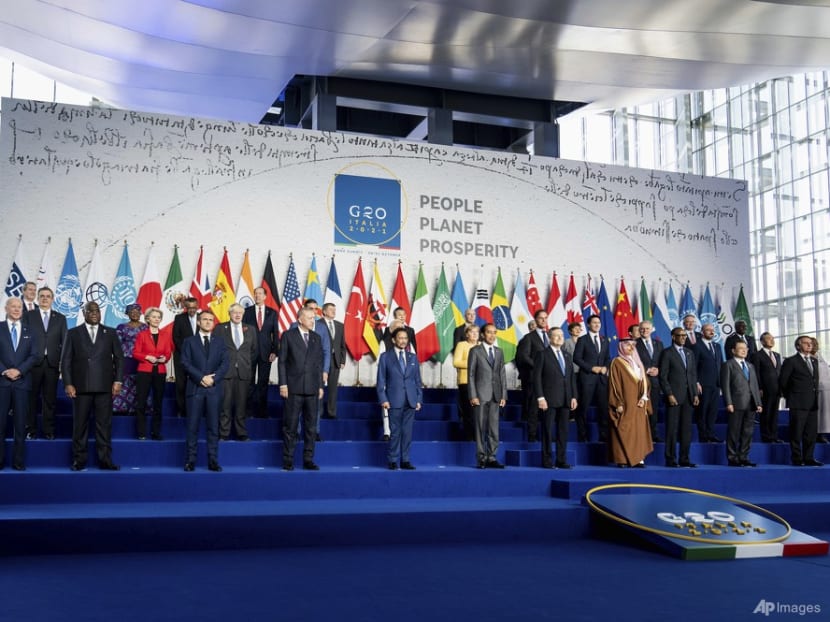Commentary: Should Indonesia invite Ukraine to G20 Summit?
Indonesia's decision to invite Russia to attend the G20 summit later this year may have drawn objections, but the host country could use this opportunity to play mediator in the Ukraine war, says this professor.

BANDUNG, Indonesia: Indonesia, the host of this year’s Group of Twenty (G20) summit, is under the spotlight as the United States and its allies, such as Australia and the European Union, suggest that Russia be excluded from the meeting for invading Ukraine.
The Russia-Ukraine war has been going on for more than a month without any sign of ceasing soon. Western countries have supported Ukraine with weapons, unilateral economic sanctions towards Russia and the mass expulsion of Russian diplomats.
President Joko Widodo, also known as Jokowi, however, has still decided to invite Russia to the G20 summit because Indonesia wants to remain impartial and maintain good relations with both warring parties. This response has prompted Western countries to demand Ukraine be invited to the summit if Russia remains on the attendance list.
SHOULD WAR BE ON G20 AGENDA?
Succumbing to the pressures from the West does not seem like a sensible option for Indonesia. This may create an unnecessary rift between Indonesia and other non-Western G20 members, such as Brazil and China, and may disrupt the summit’s overall agenda. Such a move would also be inconsistent with Indonesia’s current effort to maintain good relations with both Russia and Ukraine.
At the same time, Indonesia’s preference to take the war off the G20 agenda and focus solely on economic issues, which has gained support from China, is not prudent either.
Some Indonesian economic experts argue that the Russia-Ukraine war would likely be an unavoidable topic on the agenda. This is because the war has deepened the global economic crisis, notably by triggering fluctuations in oil and commodity prices. More than half of the G20 member countries have also firmly aligned themselves to either one of the warring parties.
The G20 summit, instead, can be a momentum for Indonesia to show its concrete contribution to the peace process by becoming a mediator between Russia and Ukraine.
Here are two main reasons why we should be optimistic that Indonesia can be an honest broker to mediate some peace talks between Russian President Vladimir Putin and Ukraine President Volodymyr Zelenskyy.
INDONESIA’S IMPARTIAL STANCE
Indonesia adheres to a “free and active” foreign policy principle. It’s based on Indonesia’s commitment to maintaining world peace and order. Based on the principle and commitment, Indonesia has preferred to avoid involvement in open conflicts with major powers and refused to align itself with one party while antagonising the other.
This stance is an essential aspect that Indonesia should adopt as the G20 “event organiser”. This would give the country a diplomatic advantage and the opportunity to be a mediator and prove a stronger multilateral role.
Indonesia’s decision to keep Russia on the G20 invitation list would show the world that its non-alignment commitment will not give in to pressure. Instead, the country can be a strategic middle power and gain trust from the warring parties.
Indonesia has not decided whether to invite Ukraine. But the possibility of having Ukraine and Russia at the G20 summit can be a good starting point. If both parties agree to meet at the summit, Indonesia can rally other G20 members, with similar stances and aspirations, to make the peace talks possible.
INDONESIA AS MEDIATOR IN RUSSIA-UKRAINE WAR?
Indonesia has a good track record in mediating regional conflicts. Lina Alexandra, a senior researcher from the Jakarta-based think tank Centre for Strategic and International Studies, wrote in her paper that, from 1988 to 1991, Indonesia played a pivotal role in ending Cambodian armed conflict and Vietnam’s occupation of Cambodia.
Alexandra also said that Indonesia served as an honest broker to facilitate peace efforts for the conflict between the Philippines and the separatist group Moro National Liberation Front, from the 1970s to the 1990s.
In 1993, Indonesia chaired the Organisation of the Islamic Conference and hosted a second round of informal exploratory talks in Cipanas, West Java. The talks resulted in a “Statement of Understanding” that led the Philippine government and the Moro National Liberation Front to sign a peace agreement in 1996.
Indonesia can repeat that success, serving as a feasible and strategic peace facilitator between Russia and Ukraine during its G20 presidency. By being an honest broker, Indonesia can also prove its capability in maintaining international order and improving its international image.
Turkey, China, and Israel are also vying for the role of mediator in the Russia-Ukraine conflict. However, as the host of the G20 Summit, Indonesia holds a golden ticket.
Indonesia needs to see tabling the Russia-Ukraine war at the G20 summit as an opportunity to facilitate peace rather than a threat that may disrupt its G20 presidency plans.
If Indonesia can bring strategic results that lead to a peace agreement, as it has successfully done before, that will be good for improving its image and bargaining power in the international arena.
Mireille Marcia Karman is an Assistant Professor at Universitas Katolik Parahyangan. This commentary first appeared in The Conversation.






